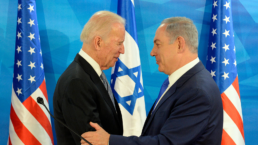The White House will not cut aid to Israel or stop cooperation overnight, but the day America treats Israel like any other country is nearer than we think.
by Meron Rapoport, +972 Magazine
Writing in Haaretz last week, Israeli security journalist Amos Harel reported that, at least in practice, the United States and Iran already have an unwritten agreement regarding the latter’s nuclear question. According to him, Iran will freeze its uranium enrichment, and in return the United States will allow the release of billions of dollars in Iranian assets across several countries, after the money was frozen as part of American sanctions. Israel, wrote Harel, has a fundamental role to play in the deal: do not disturb.
This short instruction — which we have heard often from reports about Washington’s relations with Iran and other Middle Eastern countries — might help explain a recent column by New York Times commentator Thomas Friedman, in which he claims that the White House has begun to “reassess” its relations with Israel. Days after the column was published, and after Biden met with President Isaac Herzog, Biden summoned the journalist to the White House and told him that the Netanyahu government’s plans for judicial overhaul could irreparably damage the countries’ “special relationship.”

Those who have become accustomed to headlines about the “strategic alliance” between Israel and the United States, and that Israel is the U.S.’s most important ally in the Middle East (if not the world) should, at least ostensibly, be puzzled by Friedman’s recent columns. If this alliance is so important to the U.S. government, how is it willing to reconsider it over the judicial overhaul? Or is it possible that Israel is not at all a strategic asset, but rather the exact opposite: a burden that must be kept at bay so as not interfere with American strategic moves in the region?
Recent Posts
These Veterans Starved Themselves To Protest The War In Gaza
July 8, 2025
Take Action Now As food in Gaza becomes increasingly scarce, activists are pushing their bodies to the limit in solidarity.By Emmet Fraizer, The…
ICE Agents Are Terrorizing Los Angeles With Brutal Tactics
July 8, 2025
Take Action Now ICE agents have established a pattern of brutal use of force in immigration raids.By Jonah Valdez, The InterceptSince June 6,…
Talk World Radio: India Walton On Zohran Mamdani And Freezing Out ICE
July 7, 2025
Take Action Now India Walton, former Democrat nominee for mayor of Buffalo, NY, discusses Zohran Mamdani and the race for NYC mayor and how to deal…
How Climate Change Is Worsening Flooding And Heavy Rainfall
July 7, 2025
Take Action Now The latest science on the link between climate change and natural disasters — and how they may be playing out where you live.By…




